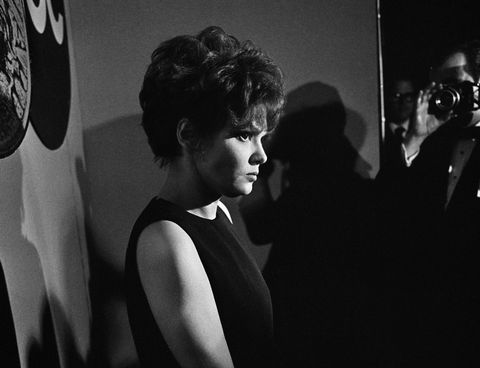Before Barbara Harris won a Tony Award, ran away with the final scene of Robert Altman’s “Nashville” or starred in the original body-switch comedy “Freaky Friday,” she was an inquisitive Chicago teenager struck by a construction project on the same block as her home, where an old Chinese restaurant was being converted into a theater.
That, at least, was how director Mike Nichols remembered it.
“When we were painting and building it, one day a young girl wandered in – because she lived on the block – and asked what we were doing. ‘We’re going to have a theater,’ we said. ‘Do you want to be in it?’ She replied, ‘OK.'”
Harris, Nichols told Life magazine in 1966, “handled the mimeographing machine” for months before working as an actor in the troupe, a group of improvisational performers that evolved into the nationally recognized comedy group Second City.
“I once asked her if she thought she would have become an actress if the theater hadn’t been on the block,” Nichols said. “She said she didn’t know.”
‘NASHVILLE’ SCENE
Harris, who died Tuesday at 83, at a hospice center in Scottsdale, Arizona, went on to perform the very first scene in a Second City production. A master at playing comic, neurotic characters, she was also a talented vocalist who drew comparisons to Judy Holliday, the versatile comedian-actress-singer.
Her characters were often artistic strivers, aspiring actresses and singers whose ambitions far exceeded their talents. For “The Apple Tree,” a Nichols-directed musical that earned Harris a best-actress Tony in 1967, she played a soot-stained chimney sweep who dreams of becoming a movie star, despite having a comically bad singing voice.
In “Who Is Harry Kellerman and Why Is He Saying Those Terrible Things About Me?” (1971), starring Dustin Hoffman, Harris received an Oscar nomination for best supporting actress – largely, critics said, on the strength of a single scene in which her actress character breaks down during an audition.
“I feel like I just auditioned for the part of a human being and I didn’t get the job,” she says, while insisting her hand is stuck to a stage lamp and won’t come off.
In perhaps her most memorable performance, she dominated what movie critic Roger Ebert described as the “unforgettable and heartbreaking” final moments of “Nashville” (1975), singing the song “It Don’t Worry Me” before a concert audience that has just witnessed an attempted assassination.
Harris also starred alongside Jason Robards in her 1965 film debut, as a social worker in the Herb Gardner adaptation “A Thousand Clowns,” and in 1976 played Jodie Foster’s mother in “Freaky Friday” and a fake psychic in Alfred Hitchcock’s final film, “Family Plot.”
She later appeared with Meryl Streep and Alan Alda in “The Seduction of Joe Tynan” (1979), was a mother in Francis Ford Coppola’s “Peggy Sue Got Married” (1986) and had small roles in “Dirty Rotten Scoundrels” (1988) and “Grosse Pointe Blank” (1997), her final movie before retiring to teach acting in Arizona.
STUMBLED INTO FAME
Through that job, she said, she was able to focus on exploring a character’s emotions or motivations – a task that interested her more than actually appearing before audiences or on camera.
“I used to try to get through one film a year,” she told the Phoenix New Times in 2002. “But I always chose movies that I thought would fail so that I wouldn’t have to deal with the fame thing. … I’m much more interested in what’s behind acting, which is the inquiry into the human condition. Everyone gets acting mixed up with the desire to be famous, but some of us really just stumbled into the fame part, while we were really just interested in the process of acting.”
Barbara Densmoor Harris was born in Evanston, Illinois, on July 25, 1935. Her mother was a piano teacher, and her father worked as a tree surgeon and restaurateur, among other jobs.
Around the time she graduated from high school in Chicago, Harris joined the Playwrights Theatre Club, which evolved into the Compass Players and then Second City. Second City chief executive Andrew Alexander said that Harris “established the role at Second City of ferociously smart women who refused to be mere adjuncts to the boys. She brought an emotional complexity that has rarely been matched.”
In the late 1950s, she was married to Paul Sills, the group’s co-founder. She performed the opening song in Second City’s premiere performance, in December 1959, and traveled with several members to New York for “From the Second City,” a 1961 Broadway revue that earned her a Tony nomination for best featured actress in a musical.
She was nominated again for “On a Clear Day You Can See Forever,” which premiered in 1965 with music by Burton Lane and lyrics by Alan Jay Lerner. (The show was adapted into a 1970 film, with Barbra Streisand portraying Harris’ role as a hypnotized chain smoker.)
A cousin, Mary Lynn Fisher, said Harris had lung cancer that metastasized into bone cancer.
“I think the only thing that drew me to acting in the first place was the group of people I was working with: Ed Asner, Paul Sills, Mike Nichols, Elaine May,” Harris told the New Times, recalling the beginnings of her career. “And all I really wanted to do back then was rehearsal. I was in it for the process, and I really resented having to go out and do a performance for an audience because the process stopped; it had to freeze and be the same every night. It wasn’t as interesting.”
Send questions/comments to the editors.


